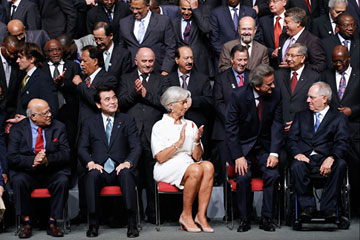
Lagarde, center, at a meeting of the International Monetary Fund and World Bank in Tokyo. She has led the IMF since 2011.
On a chilly night in March, in a concrete building on the grand Avenue d'Iéna in Paris, a silver-haired woman sits at an empty conference table. Most of the offices at the International Monetary Fund are dark, but managing director Christine Lagarde has been on the phone for the past several hours, handling a flurry of calls to try to rescue yet another teetering European economy from collapse. Lagarde turns off the video monitor connecting her to staff at the fund's headquarters in Washington and eases into an armchair to pour a cup of Darjeeling tea, one of her rituals of life on the road. She started the day in Algiers, hosting an all-women's breakfast with a film producer, an AIDS lobbyist and others. That had been a welcome change after "spending two days with authorities and finance people and banking people--all men, all men," she says. The difference is not just about gender. "The Minister of Finance is going to talk to me about the macroeconomic framework," Lagarde says. "The central-bank governor is going to talk to me about the capital ratio of banks." Women, on the other hand, "talk about things they do on a daily basis." That resonates with Lagarde, a lawyer by training and a politician by instinct. She doesn't speak in the opaque language of the IMF's economic-policy wonks and insists this is an advantage. "Sometimes there are meetings when I stop the talking and say, 'Stop it. You've lost me,'" she says. "You have to use simple terms that people out on the street will understand, because otherwise you are just talking to yourselves."
The disconnect between Europeans and their economic policymakers has never been sharper. Five member nations of the European Union have come close to bankruptcy since 2010, with the latest narrowly averted disaster shaking the tiny island of Cyprus, home to just 1.1 million people and an economy the size of Boise, Idaho's. Because it is part of the E.U., the other members had to come up with a plan to bail out Cyprus' failing banks or risk sending the European--and eventually global--economy into a tailspin. The result was not pretty: a disastrous first agreement sparked a week of protests and threats of a bank run. The eventual deal may stave off default for Cyprus and save the euro from free fall--for now. But the process of getting to the deal revealed just how deep Europe's economic dysfunction runs.
The agreement ought to have been vindication for Lagarde, 57, who has been warning about the need for basic changes in the way the E.U. functions since before she took over the IMF post in 2011. The IMF was formed in 1944 to avert another Great Depression by lending money to troubled countries, but after decades of dealing mainly with the third world, the IMF now devotes 83% of the money in its general-resources account--extended loans, in plain speak--to three limping European nations: Portugal, Greece and Ireland. Lagarde says their immediate problems, mostly the products of profligate spending and borrowing, are distracting the E.U. from essential reforms, like creating a continent-wide banking system to impose strict regulations and safeguards against those very problems. "Crisis management has been the day-to-day life," she says. "They need to spend energy and focus on the long-term backbone of Europe to make it a strong regional monetary, banking and fiscal institution."
